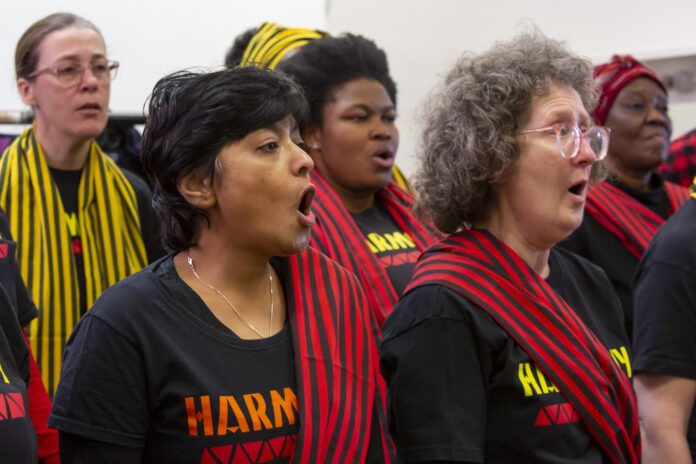The Philosophy and Working Principles of the Natural Voice Network encompass the idea that natural voice practitioners believe that singing is our birthright. For thousands of years all over the world people have sung – to express joy, celebration and grief, to accompany work and devotion, to aid healing – without worrying about having a “good” voice or “getting it right”. Song has been a part of life, a way of binding the community together. We aim to recreate the sense that vocalising, singing and singing together are natural and open to all.
The Code of Practice for members of the Natural Voice Network aims to ensure that they foster the highest standards of natural voice and inclusive practice.
NVN PHILOSOPHY AND WORKING PRINCIPLES
Our Philosophy
As Natural Voice practitioners we believe that singing is our birthright. For thousands of years, all over the world people have sung – to express joy, celebration and grief, to accompany work and devotion, to aid healing – without worrying about having a “good” voice or “getting it right”. Song has been a part of life, a way of binding the community together.
We aim to recreate the sense that vocalising, singing and singing together are natural and open to all.
Each person’s voice is as unique as their fingerprint and, respecting that individuality, we aim to provide people with opportunities to express themselves vocally and to develop their full vocal potential. The voice we are born with is capable of freely expressing a full range of emotions, thoughts and experience – this is what we mean by the Natural Voice. However, the tensions and stresses of daily life can create physical and emotional blocks to the Natural Voice. We therefore focus on breath and bodywork as the foundations of healthy voice use.
We are principally concerned with the melodic voice – the voice as it moves from speech to melody – the voice that is instinctively used in folk traditions around the world. In this culture many people see themselves as non-singers because of previous experiences of criticism and judgement. Many are excluded from singing groups if they do not have music reading skills. Therefore we aim in our work to counteract these experiences and to give people confidence in their melodic voice by providing a supportive learning environment. We believe that vocalising, creativity and song should be accessible to all, regardless of previous musical ability or experience. Therefore, creating a sense of an accepting community is an essential element of our approach in working with groups. This means not only tolerating difference but welcoming it, by positively including people who have many different needs or face particular social barriers.
Our approach to teaching by ear is a fundamental means of ensuring access, but we recognise that social factors (such as income, class, gender, ethnicity, age, disability, health, sexuality) can also create barriers to accessing singing opportunities. We are therefore committed to an ongoing process of learning about the barriers to participation some people will experience, and ways we can counter these.
Our working principles
- We provide a range of opportunities for people to explore their voices and enjoy song. Typically, we run voice and song workshops; offer training, short courses and creative projects; and run community choirs. These opportunities are open and accessible to everyone, regardless of musical knowledge or experience.
- We work in ways that enable everybody to participate as actively as possible. This includes working at a pace which recognises the needs of the less experienced and slower learners; using a variety of language, teaching styles and material; taking account of the diversity of individual needs (additional guidance to follow); using demystifying and accessible language and avoiding technical language and jargon; fostering a non-judgmental and supportive learning environment; talking in terms of unlocking, freeing, allowing, releasing and discovering the authentic voice.
- We aim to teach songs by ear, recognising that the majority of the music in the world comes from the oral tradition and that this is the most accessible and effective way for the majority of people to learn and retain songs.
- We regard vocal and physical warm-ups as an essential element of our work. They ensure healthy vocal use by anchoring the voice in the body and breath and generally prepare the voice for action. They also allow opportunities for increasing creativity, practising listening to others and creating a sense of community.
- We are concerned with the enjoyment of singing and making it accessible, so the main focus in our work is on the process of coming together to sing, whilst at the same time developing people’s vocal skills and, within the context of performance, aiming for the highest standards.
- Respect for individuals, traditions and creativity is essential to our work. We acknowledge and accept that each voice is unique to the individual; we credit the origin of each song and vocal/physical exercise, where possible, and avoid the use of inappropriate or exploitative material; we use relevant singing styles appropriate to the culture that a song comes from; and we present the historical and cultural contexts of songs, where known.
- We are committed to the principles of sustainability in our voice work, promoting practices which minimise environmental impact, supporting equality and social justice, and advocating fair remuneration for work undertaken.

